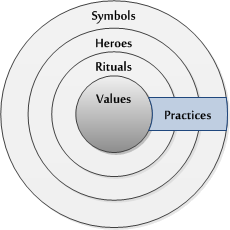Culture management
When I ask people if they know of any experience of problems when working with people from other cultures, the response is always negative. But when I ask for some specific 'tells' of cultures, then they suddenly realise there is indeed a difference in people's behaviour between countries. It's just that they have already taken those into account. Soon after working in a multicultural environment, you don't notice differences anymore, or at most you see them as personal characteristics of the people you are working with.
Culture management brings this unseen mechanism above the water line and shows people how their expressions, actions or inactions are interpreted by others, with different roots and values. It helps to streamline relations and work, but most of all it helps to prevent invisible pitfalls that can cost you an entire business if unheeded.
The authority on culture management is Professor Geert Hofstede. He researched cultural differences across the world and came up with a practical model that helps identify these distinctions. It starts with knowing the basis of culture:
- Values
- Heroes

- Rituals
- Symbols
This basis can be used to identify differences across cultures, nations, peoples. It changes across geographical regions, but differences can be seen within cities as well, particularly where people from different nationalities have moved to the same location.
The Hofstede model identifies 6 different dimensions in which various cultures each have different positions:
- Power distance Low vs High (PDI)
- Individuality vs Group thinking (IDV)
- Masculinity vs Feminity (MAS)
- Uncertainty Avoidance vs Indifference (UAI)
- Long term Orientation vs Short term Orientation (LTO)
- Indulgence vs Restraint (IND)
PDI is about the social distance between people in higher or lower positions, like teachers and pupils, the mayor and the plumber. The opposite end if where people treat each others as equals no matter what their position.
IDV is about people making decisions for themselves, for isntance prioritizing careers. The opposite end is about prioritizing for the group, prioritizing the group's needs ahead of themselves.
MAS is about people needing to be 'tough' and conform to a presetablished role, for instance the rapper who has to act cool and anti-establishmend. The opposite end is about being able to do what needs to be done no matter their background.
UAI is about the need for strict protocol in all kinds of social interactions in order to establish clearly who should do what, for instance all roles involved around a public speech of a government official. The opposite end is about allowing people do take on whatever comes on their path regardless of their role.
LTO is about making decisions to secure a future. The opposite end is about pragmatism and making sure that quick wins are always achieved where possible.
